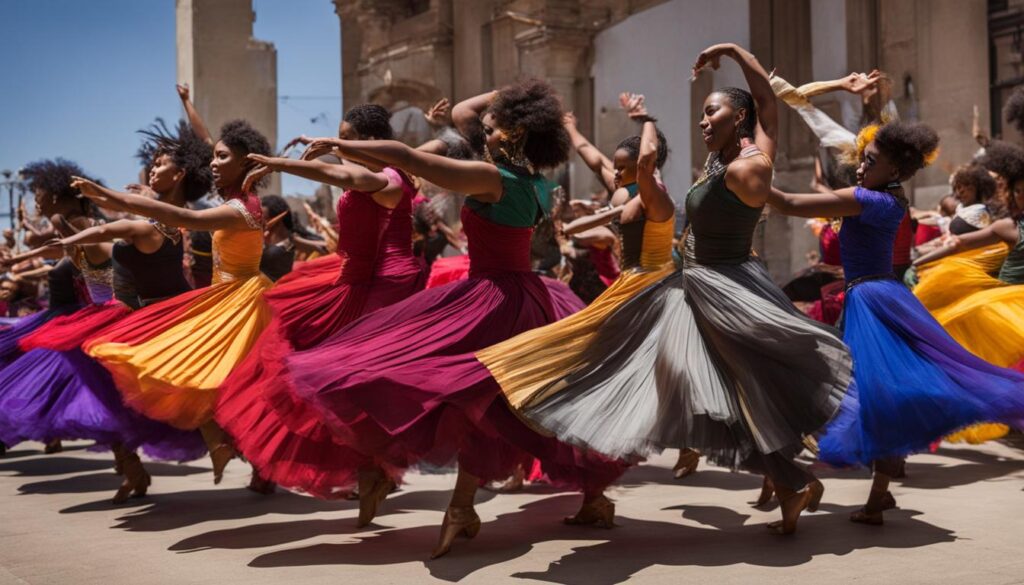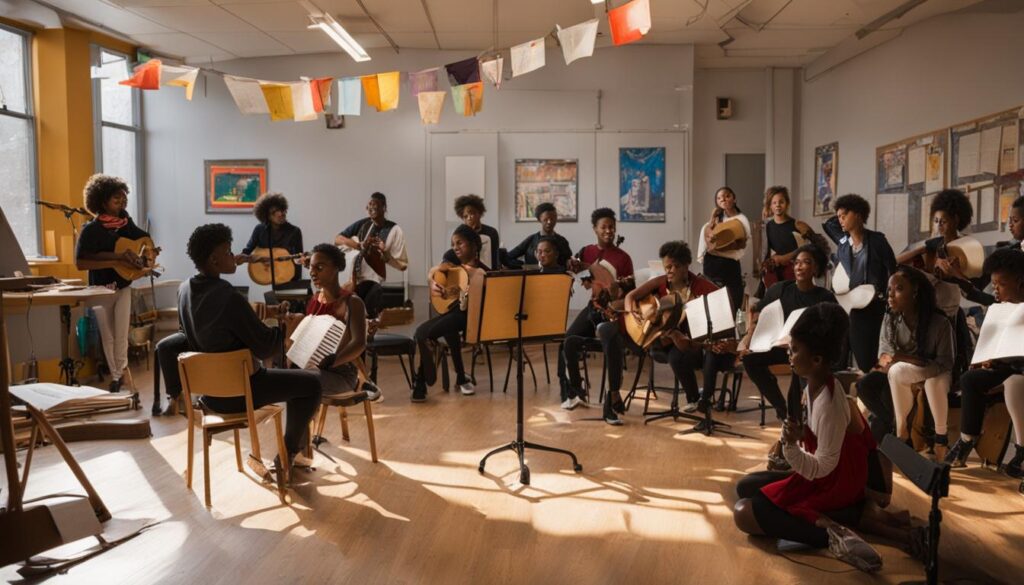The performing arts industry is a vibrant and diverse field that offers exciting career opportunities for individuals passionate about creativity and being on stage. Whether you have a knack for acting, dancing, or any other form of performance, there are countless paths you can explore within the world of performing arts.
From Broadway productions to local theater groups, the performing arts industry is teeming with job opportunities waiting to be discovered. If you have a love for the stage and a desire to pursue a career in the performing arts, there are plenty of options to consider. In this article, we will delve into various careers, degree programs, salary prospects, and job outlooks in the performing arts field.
Key Takeaways:
- The performing arts industry offers diverse career opportunities for individuals passionate about creativity and being on stage.
- There are numerous career paths within the performing arts, including acting, dancing, singing, comedy, and more.
- Pursuing a degree in performing arts can provide the necessary training and knowledge to excel in the field.
- Salary prospects in the performing arts vary based on factors such as job type, experience, and location.
- Having a degree in performing arts can lead to various job options in performance, production, business, art, and education.
Different Careers in Performing Arts
The performing arts industry is not limited to just actors and actresses. There are numerous career paths within this field that cater to a wide range of talents and interests. Whether you have a passion for dancing, singing, comedy, opera, or even ventriloquism, there are opportunities for you to thrive in the performing arts industry.
When it comes to dancing, performers can specialize in various genres and styles such as ballet, modern dance, jazz dance, and hip-hop dance. Each style offers its own unique challenges and artistic expression, allowing dancers to showcase their skills in different ways.
Aside from dancing, singers have the chance to explore various genres like pop, rock, opera, musical theater, and more. Singing requires not only a beautiful voice but also the ability to convey emotion and tell a story through song.
Comedy is another thriving area in the performing arts industry, where individuals can pursue careers as stand-up comedians or comedic actors. Making people laugh and bringing joy to audiences is a valuable skill that can open doors to different opportunities in the entertainment world.
Table: Performing Arts Career Paths
| Career Path | Description |
|---|---|
| Acting | Portraying characters in plays, movies, or TV shows. |
| Dancing | Performing dance routines in various genres and styles. |
| Singing | Using the voice to convey emotions and tell stories through song. |
| Comedy | Making people laugh through stand-up comedy or comedic acting. |
These are just a few examples of the many career paths available in the performing arts industry. Each profession offers its own unique challenges and rewards. Whether you aspire to be in the spotlight or work behind the scenes, the performing arts industry has something for everyone.
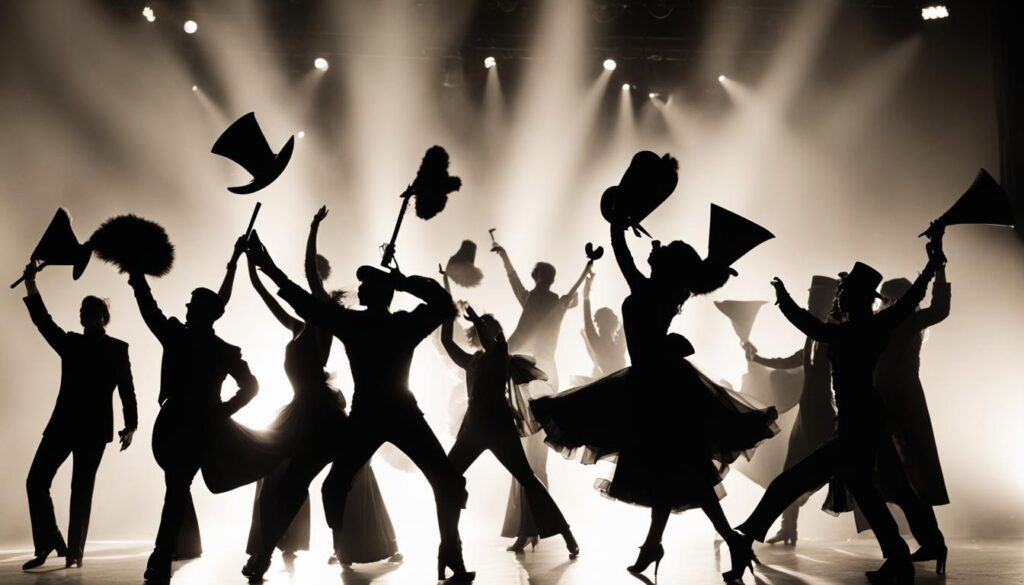

Degrees and Majors in Performing Arts
When it comes to pursuing a career in the performing arts, having a degree can be highly beneficial. There are various colleges and universities that offer specialized programs and degrees tailored to the different areas of performing arts. Whether you’re interested in acting, dancing, or music, there are college degree options available to help you develop your skills and knowledge in your chosen field.
Performing arts schools provide a structured environment where students can immerse themselves in their craft and learn from experienced professionals. These schools offer a range of majors and degrees that focus on different aspects of performing arts. Some popular majors include theater arts, music performance, dance, and film. These programs provide comprehensive training and education, equipping students with the necessary skills to succeed in their careers.
One example of a performing arts degree program is the Bachelor of Fine Arts (BFA) in Acting. This program typically includes courses in acting techniques, voice training, movement, and theater history. Students also have the opportunity to participate in various productions, gaining practical experience and building their portfolio. Another example is the Bachelor of Music in Music Education, which prepares students to become music teachers in schools and other educational settings.
| Degree | Major | School |
|---|---|---|
| Bachelor of Fine Arts (BFA) | Acting | XYZ University |
| Bachelor of Music | Music Performance | ABC Conservatory |
| Bachelor of Arts (BA) | Theater Arts | 123 College |
| Bachelor of Fine Arts (BFA) | Dance | DEF School of Dance |
When considering pursuing a degree in performing arts, it’s important to research and find the best program that aligns with your career goals. Look for schools that have a strong reputation in your desired field and offer opportunities for practical experience and networking. Additionally, consider the resources and facilities available at the schools, as they can greatly enhance your learning experience.
Salary and Job Outlook in Performing Arts
When considering a career in the performing arts, understanding the salary and job outlook is essential. While the financial aspects of this field can vary widely, performers have the potential to earn a lucrative income through their talent and experience. However, it’s important to note that earnings often depend on factors such as the type of performance, location, and individual negotiation skills.
| Job Title | Median Annual Salary | Job Outlook |
|---|---|---|
| Actor/Actress | $39,440 | 4% growth (as fast as average) |
| Dancer | $17.49 per hour | 3% growth (slower than average) |
| Singer | $54,560 | 1% growth (little or no change) |
| Comedian | $30,400 | -3% decline (slower than average) |
| Opera Singer | $83,880 | N/A |
Performing artists often negotiate rates based on their previous earnings, contract terms, and the length of the performance. Successful performances can lead to additional opportunities and higher earnings.
According to the U.S. Bureau of Labor Statistics, the job outlook for performing artists is expected to increase slightly in the coming years. While the growth rate may vary depending on the specific field, it’s important for aspiring performers to stay proactive and continuously improve their skills to stand out in a competitive industry.
Despite the challenges and uncertainties, pursuing a career in performing arts can be incredibly fulfilling for those who are passionate about creativity and self-expression. It offers a unique opportunity to share one’s talents with audiences and make a meaningful impact in the field. While financial considerations are important, it’s equally crucial to remember that the true value of a performing arts career lies in the joy and satisfaction it brings.
What Jobs can You get with Performing Arts?
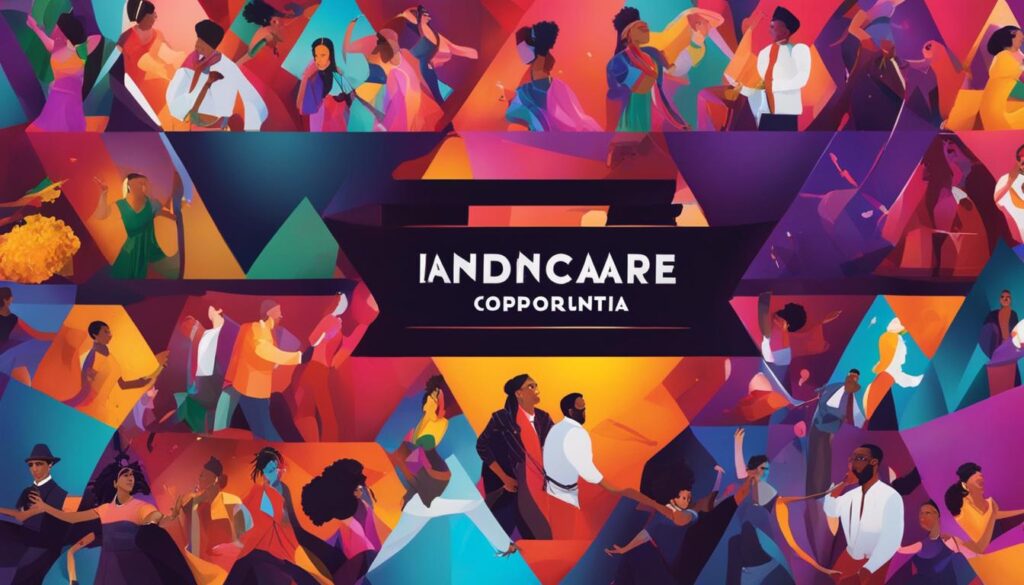

If you have a degree in performing arts, you have a wide range of job opportunities available to you. The skills and knowledge gained from studying performing arts can be applied to various fields and industries. Here are some of the job options that you can pursue with a performing arts degree:
- Performance and Production: Many graduates of performing arts programs go on to work as actors, dancers, or musicians. They may perform in theater productions, films, television shows, or musical concerts. Some may also work behind the scenes in production roles, such as directing, choreographing, or stage managing.
- Entertainment Industry: The entertainment industry offers numerous job opportunities for performing arts graduates. You can work in areas such as talent management, casting, event planning, public relations, or arts administration. These roles involve working closely with performers and helping to coordinate and promote their work.
- Teaching: With a performing arts degree, you can also pursue a career in education. You can become a performing arts teacher at a school or university, teaching students about acting, dancing, or music. You can also offer private lessons and workshops to aspiring performers.
- Commercial Art: Many performing arts graduates find work in the commercial art industry. This includes areas such as advertising, marketing, graphic design, and multimedia production. Your creativity and ability to perform can be valuable assets in creating engaging and impactful visual content.
- Business and Entrepreneurship: The skills acquired through studying performing arts, such as communication, teamwork, and adaptability, are highly valued in the business world. You can apply these skills to start your own performing arts company, work in arts management, or pursue careers in areas such as event planning, marketing, or public relations.
These are just a few examples of the many job opportunities available to individuals with a performing arts degree. The key is to identify your interests and strengths within the performing arts field and explore how they can be applied to different professions. Your creativity, passion, and dedication will play a significant role in shaping your career path and finding success in the performing arts industry.
Skills needed in Performing Arts
Being successful in the performing arts requires more than just talent and technical skills. Performers also need to possess a variety of attributes and qualities that contribute to their overall success. Here are some essential qualities and skills that performers need to excel in their chosen discipline:
Confidence and Resilience
Performing on stage can be both exhilarating and nerve-wracking. It requires performers to have confidence in their abilities and believe in themselves. Confidence allows performers to take risks, explore new creative avenues, and captivate their audience. Additionally, resilience is crucial in the face of rejection or setbacks. Performers need to bounce back from failures, learn from them, and continue to pursue their passion.
Teamwork and Collaboration
Performing arts often involve working in groups or ensembles, whether it’s a theater production, dance performance, or musical ensemble. Collaboration and teamwork skills are essential for performers to work harmoniously with others, listen to different perspectives, and contribute effectively to the overall performance. Being able to collaborate and cooperate with fellow artists enhances the quality of the performance and creates a positive working environment.
Creativity and Adaptability
Performing arts are inherently creative fields, and performers need to possess a strong sense of creativity. They should be able to think outside the box, bring their unique ideas to the table, and constantly innovate. Additionally, adaptability is crucial in the performing arts, as performers often face unexpected changes or challenges. Being able to adapt to different performance spaces, styles, and last-minute adjustments is essential for successful performances.
Analytical Thinking and Problem-Solving
Performers need to have analytical thinking skills to analyze scripts, scores, or choreography, and understand the nuances and motivations of their characters. They should be able to critically analyze their own performances, identify areas for improvement, and make necessary adjustments. Problem-solving skills are also important in the performing arts, as performers may encounter technical issues or performance-related challenges that need to be resolved quickly and efficiently.
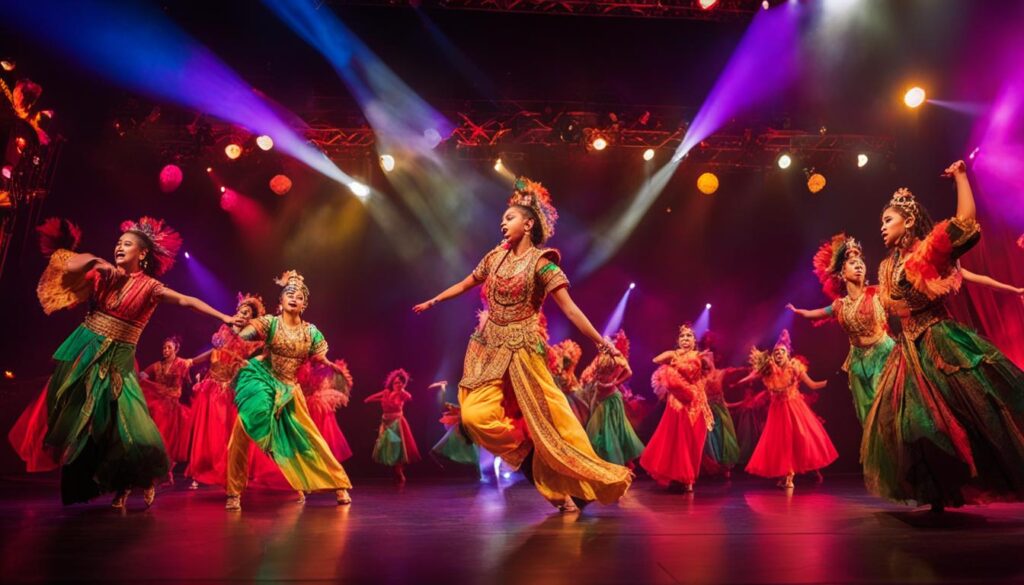

Mastering these skills and qualities not only enhances performers’ abilities but also contributes to their overall growth and success in the performing arts. Aspiring performers should focus not only on honing their technical skills but also on developing these essential attributes that are integral to a successful career in the performing arts.
Conclusion
In conclusion, pursuing a career in performing arts can open up a world of possibilities. With a diverse range of opportunities, individuals passionate about the arts can find fulfilling and rewarding professional paths. Whether it’s acting, dancing, singing, or other forms of performance, the performing arts industry offers a platform to express creativity and make a meaningful impact.
There are abundant job opportunities available for those with a degree in performing arts. Graduates can explore careers in performance and production, as well as venture into fields like business, art, and education. Whether it’s working in the entertainment industry, commercial art, or teaching, the skills gained from a performing arts degree are highly transferrable.
Key attributes and skills are essential for success in the performing arts. Alongside talent and specialized skills, performers need qualities like confidence, resilience, and self-reflection. Additionally, teamwork, creativity, analytical thinking, and adaptability are crucial to navigate the ever-evolving landscape of the performing arts industry. Demonstrating these qualities and continuously honing these skills can pave the way to a thriving career.
With an expected increase in job prospects, the performing arts industry holds promising opportunities for aspiring artists. By staying dedicated, passionate, and continuously seeking growth, individuals can carve out a successful path in their chosen performing arts profession. Pursuing a career in performing arts allows for the expression of creativity and the ability to make a positive impact within the field.
FAQ
What career opportunities are available in the performing arts?
The performing arts industry offers diverse career opportunities, including acting, dancing, singing, comedy, opera singing, ventriloquism, and more.
What majors and degrees are available in the performing arts?
Colleges and universities offer various majors and degrees in performing arts, such as film schools, music schools, acting schools, and theater schools.
How much can a performing artist earn?
The salary of a performing artist can vary depending on the job, experience, and location. Successful performances and negotiations can lead to higher earnings.
What career options are available for individuals with a performing arts degree?
Graduates can pursue careers in performance and production, as well as in fields like business, art, and education. There are job options available in the entertainment industry, commercial art, teaching, and more.
What skills are needed in the performing arts?
Performing artists require attributes such as confidence, resilience, and self-reflection. They also need skills like teamwork, creativity, analytical thinking, and adaptability.
What are the job prospects in the performing arts industry?
The job outlook for performing artists is expected to increase slightly in the coming years, according to the U.S. Bureau of Labor Statistics.
